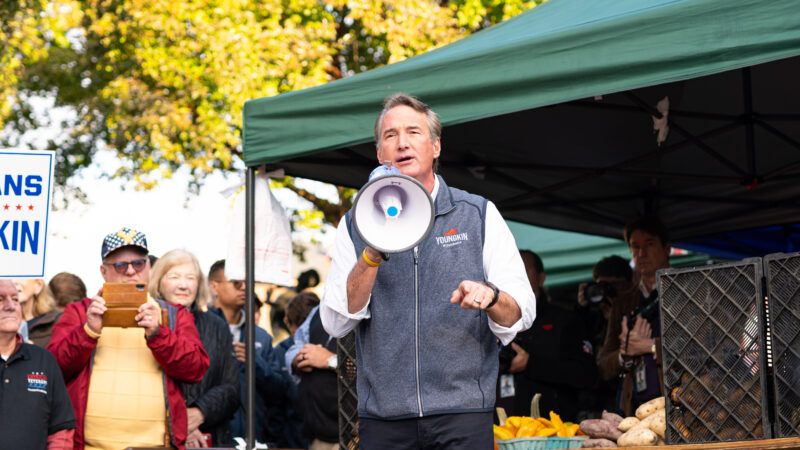Virginia Next for Occupational Licensing Reform
The state will fast-track applicants who have out-of-state credentials or experience.

The General Assembly of Virginia this month approved a proposal to recognize out-of-state occupational licenses and work experience as per se qualifications for in-state credentials.
To qualify, the applicant must have held her out-of-state license for at least three years and reside in good standing with that state's board. Individuals seeking a Virginia license for a profession that was not licensed in their previous state can qualify with three years of work experience and an examination. Both provisions will, in many cases, allow workers to avoid excessive time and money costs associated with seeking a license in a new state.
"Universal license recognition will assist in resolving worker shortages while at the same time benefiting consumers through reduced costs of goods and services," Virginia Gov. Glenn Youngkin said in a statement last week. Youngkin's conclusions are well-founded. "Standard economic models imply that the restrictions from occupational licensing can result in up to 2.85 million fewer jobs nationwide, with an annual cost to consumers of $203 billion," Morris M. Kleiner, a professor at the University of Minnesota, wrote in 2015.
Occupational licensing's economic impacts are due largely to the practice's widespread popularity. In 2021, more than a fifth of U.S. jobs required a license. Policy makers justify licensing regimes as necessary consumer protections, but many of them are purely protectionist measures meant to inflate the wages of already licensed workers and stave off competition. Indeed, in the newly released Empowering the New American Worker: Market-Based Solutions for Today's Workforce, Chris Edwards of the Cato Institute argues that "large interstate differences [in which professions require licenses] suggest that rules are not based on analyses of health or safety but rather reflect differences in state and local politics."
What's more, research shows that occupational licensing fails at its own prescribed task. "Licensing, and progressively stricter forms of it, is not associated with greater service quality across any of our nine comparisons," reads a 2022 report from the Institute for Justice. "In fact, in eight of the nine comparisons, we find no statistically significant difference in quality at all. In the ninth—our comparison of tree trimmers in licensed Maryland and unlicensed Virginia—quality is higher in unlicensed Virginia and statistically significantly so."
While the logic of licensing high-skill, high-risk occupations is defensible—though not undisputed—many regulated professions have no need for bureaucratic oversight. Virginia's regulated professions, for instance, include "apprentice tattooer[s]," estheticians, "martial artists," "wax technicians," and "temporary wrestler[s]." This is hardly a cohort from which the public requires economy-killing regulatory protections. Virginia's reform—accelerating the licensing process for already credentialed or experienced workers—is laudable, but a full-scale review of the larger system is in order.
"Every American has the right to 'life, liberty, and the pursuit of happiness,'" Edwards concludes. "Freedom to use one's labor in a chosen occupation is central to that pursuit."
Editor's Note: As of February 29, 2024, commenting privileges on reason.com posts are limited to Reason Plus subscribers. Past commenters are grandfathered in for a temporary period. Subscribe here to preserve your ability to comment. Your Reason Plus subscription also gives you an ad-free version of reason.com, along with full access to the digital edition and archives of Reason magazine. We request that comments be civil and on-topic. We do not moderate or assume any responsibility for comments, which are owned by the readers who post them. Comments do not represent the views of reason.com or Reason Foundation. We reserve the right to delete any comment and ban commenters for any reason at any time. Comments may only be edited within 5 minutes of posting. Report abuses.
Please to post comments


The article hints at this but it should be said more bluntly.
Reciprocal licensing is better than the status quo but the better answer for almost all the regulated "professions" above is to simply abolish the licensing requirement entirely.
Agreed most heartily! We have "Yelp" (etc.) these days for YEARS now! I don't NEED no stinkin' licenses!!! Fuck off, Government Almighty!
Great article, Mike. I appreciate your work, I’m now creating over $35,200 dollars each month simply by doing a simple job online! I do know You currently making a lot of greenbacks online from $28,200 dollars, its simple online operating jobs.
.
.
Just open the link———————————————>>> http://Www.JobsRevenue.Com
Baby steps.
Temporary wrestler? I'm trying to imagine. Like they stop mid-bout?
Maybe Kelly Services provides them when needed.
Google pays an hourly wage of $100. My most recent online earnings for a 40-hour work week were $3500. According to my younger brother’s acquaintance, he works cs-02 roughly 30 hours each week and earns an average of $12,265. I’m in awe of how simple things once were.
.
.
See this article for more information————————>>>GOOGLE WORK
Sung to the tune of, "Oh Lord, won't you buy me a mercedes benz":
O Lord, won't you buy me a license or three
A locksmithing tatoo while trimming a tree
I wait for the customers, can't do it for free
So Lord, won't you buy me a license or three
https://www.youtube.com/watch?v=Qev-i9-VKlY